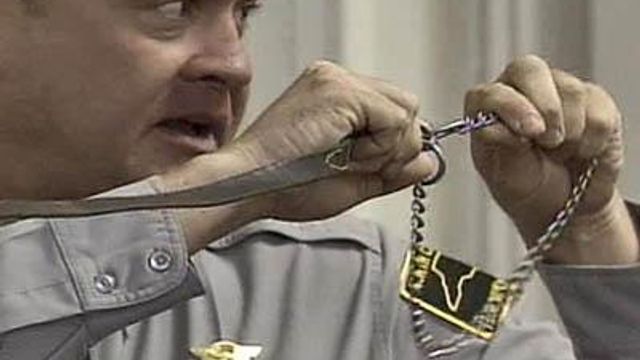Troopers defend dog-training techniques
Other law enforcement officers say they would never use the techniques seen in a controversial video.
Posted — Updated(Caution: Contents of the video may disturb some viewers.)
Jones has sued to regain his job, saying he was fired only because members of Gov. Mike Easley's office pressured the Highway Patrol to get rid of him. Several other troopers were accused of other offenses at the time, prompting Easley to order an outside review of the agency.
Lt. Col. Cecil Lockley, who signed off on Jones' dismissal, read a statement Tuesday saying he was wrong.
"The decision to fire Sgt. Jones was predetermined not by the patrol's disciplinary process, (but) by an outside entity," Lockley said in the statement.
Meanwhile, Jones' lawyer, Jack O'Hale, claimed the video clips show Jones using training techniques that he had been taught by the Highway Patrol. Ricoh was a particularly aggressive dog that required extra training, O'Hale said.
Other troopers agreed, testifying Tuesday before the state Office of Administrative Hearings – a quasi-judicial agency – that Jones was doing only what was necessary to train the dog.
"Even though it appeared the animal was abused, it was an acceptable technique used by canine handlers, and (Jones) was trained to do that," Lockley said.
"Worse things have happened in the past and been done," Trooper James Pickard said. "You have to have total control over these dogs at all times. If that means kicking him, hitting him, choking him, whatever it takes. It becomes an extreme liability on the side of the road if you cannot control that dog."
Lt. Don Cole described other accepted techniques, such as suspending a dog out of a window when he doesn't obey or forcing a dog onto the ground.
"Ricoh was one of the high-driven dogs. (He was an) alpha dog, just pack leader, wanted to be in charge," Cole said.
Members of other law enforcement agencies said they would never use such techniques to train their K-9s.
"We don't train our animals that way," said Maj. Lucy Zastrow, of the Durham County Sheriff's Office. "I'm not familiar with that technique."
"I've never seen that before. It's not something we do here," said Sgt. Bobby Lane, the K-9 handler for the Chatham County Sheriff's Office.
"It's not something I've ever seen and not something I would think you would do to get a dog to release a toy," said Tracy Bowling of Ventosa Kennels, who trains deputies for Wake and Johnston counties and trains K-9 handlers nationwide.
The Highway Patrol's canine-training manual doesn't specify any methods that are banned or allowed.
Bryan Beatty, secretary of the state Department of Crime Control and Public Safety, testified Monday that Jones' actions were unlike any many trainers with the Highway Patrol had ever seen. Kicking a dog as Jones' did or leaving it suspended was excessive and unacceptable, Beatty said.
A veterinarian examined Ricoh shortly after the training exercise and found the dog wasn't injured. The Highway Patrol removed Ricoh from Jones' care, and the dog has been retired from active duty.
• Credits
Copyright 2024 by Capitol Broadcasting Company. All rights reserved. This material may not be published, broadcast, rewritten or redistributed.






